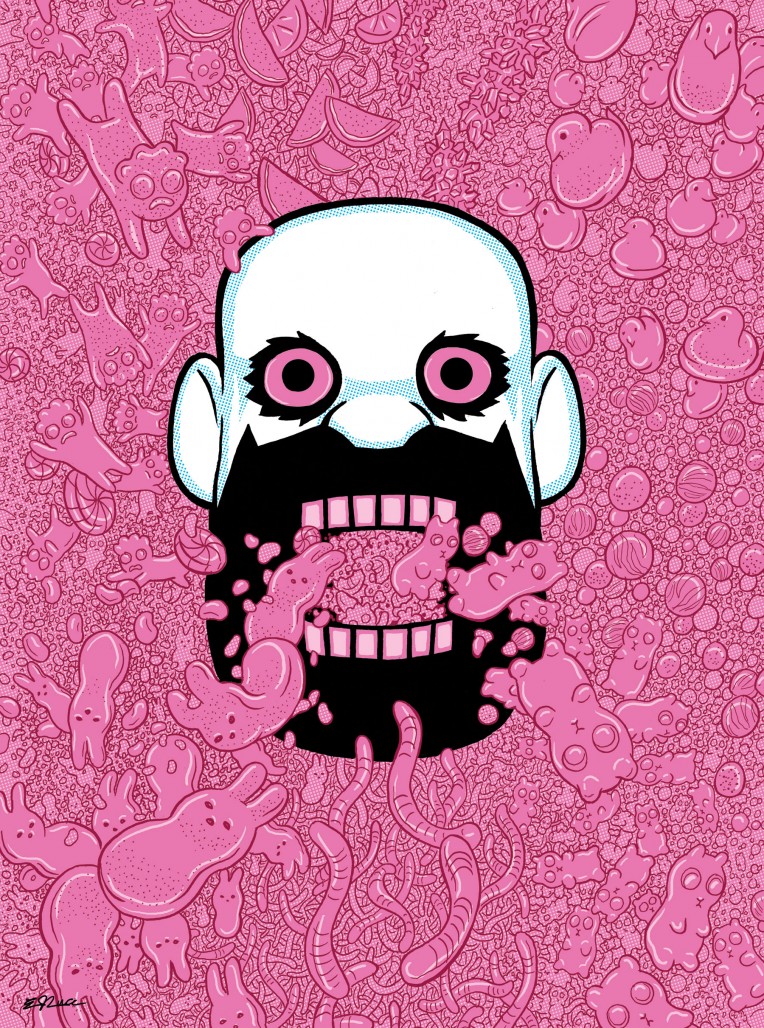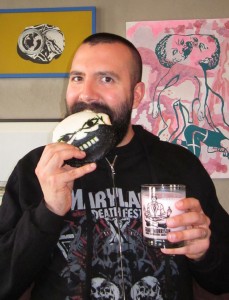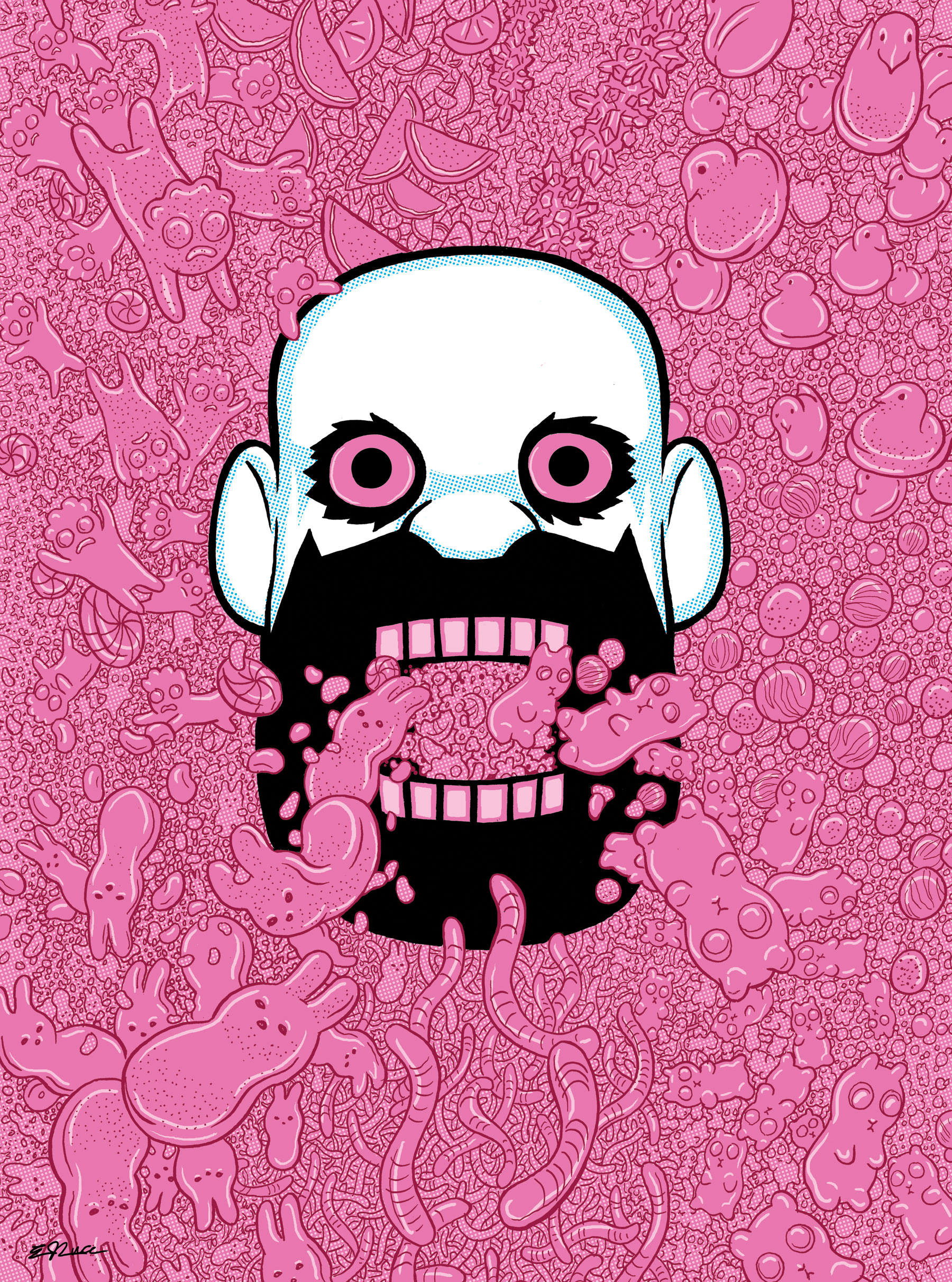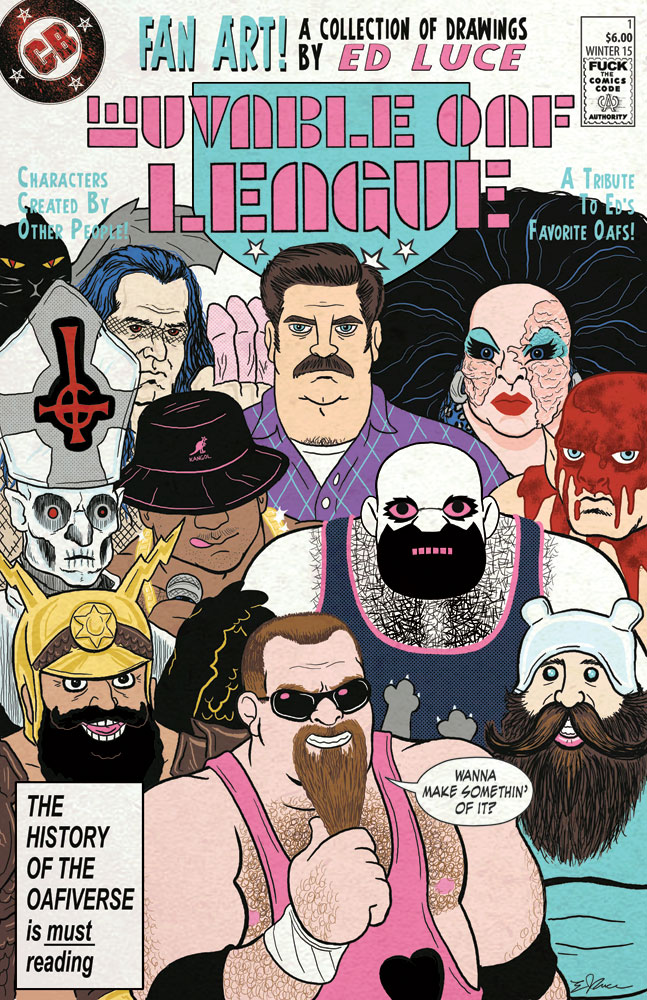Images courtesy of Ed Luce
In anticipation of the launch of his first project in comics, Wuvable Oaf, The Beat took a minute to talk with Ed Luce about making the switch from fine art, wrestlers as superheroes and the importance of diverse narratives.

Ed Luce: Well, it was an entirely practical thing on my part, but also influenced by moving to San Francisco. San Francisco [is] a great comics town. The practical side was I moved into a small studio apartment. I couldn’t do the giant paintings I was doing or the larger painting series I used to do a lot of. My bedroom suddenly became a small tiny closet without the studio.Comics are something that don’t need a lot of materials or a lot of room so when I was reduced to a table top I kind of shifted to that. I started to work in an art store and a lot of comic artists would come in. Half a block from my house is Isotope Comics Lounge which was a huge influence on me early on, definitely, which sort of precipitated the shift.My paintings were already really cartoony to begin with, especially the last couple series, so it just felt like a natural move but as the story goes I was asked to contribute some designs for a paper-doll themed show at the Trunk Space, which is a gallery in Phoenix, Arizona, and one of the designs I created just kind out of the blue was this character called Wuvable Oaf.
Burke: Part of the blurb about Wuvable Oaf includes this idea that it’s an ex-wrestler meeting Sex and the City.
Luce: Yeah, that may seem awkward at first glance but that was written by Jacq Cohen, the PR person for Fantagraphics. She is a devout fan. She has a real close read of things, she has her own perspective on it. Some people may hedge at the Sex and the City comparison–I’ve never actually watched that show–but for her to see something like that in it, I appreciate the comparison because then you drop the wrestler into that reference and it gets blown apart. We didn’t even talk about the wrestling thing, which is my version of superheroes. I’m a lifelong wrestling fan and I feel like in some ways they are the superheroes of the real world, or, you know, the reality world, maybe not real world. I was interested in imprinting the wrestling influence on the comic because that’s something that I’ve watched since I was a kid.
Burke: What was it like having to add in the writing component? Did you have any prior experience?
Luce: I didn’t and that was definitely an intimidating part. I kind of made my own [comics] that will never see the light of day when I was 13 or 14, a type of superhero comic, but again it just never occurred to me to do any kind of writing. I was very much focused on studio practice. When I did finally come to the table to make a comic the drawing part came naturally but actually having to kind of weave together a story line was a bit of a challenge. And I think that you can see [that weaving] in the Fantagraphics book. I kind of weave together several sub plots. I didn’t want to write the same character doing the same thing over and over again. I ended up working in a large cast of secondary characters…One of the things that’s been exciting and a little intimidating for me with this book coming out, these are my first real comics and I didn’t think anybody would see them. I’m interested and I’m very attuned to the feedback and the response I’m getting from the writing so far.
Burke: Are you surprised at all by the popularity of the narratives that you’re putting out?
Luce: At a very basic level, definitely. When I compose the story and wrote the story I really thought it’s a valentine to sort of San Francisco’s Bear, Gay community definitely and I thought “Well, I’ll try and make it open for other people,” having had this experience making fine art exclusively for one audience. But I never dreamed that it would kind of expand at least to the level that Fantagraphics would want to put it out. And I think that is a testament to trying to keep it open ended, not compromising the queer themes but trying to write them and approach them in a way that’s a little bit more universal and not explicit.To have people pick it up and be able to relate to and adopt this character that, I think, is very queer, his perspective is very queer, it’s really, it’s heartening to me. I think, too, the body type. I hate to bring up this term because it’s already been brought up and beaten to death, the whole “dad-bod” thing. I think straight guys embracing this different body type and not feeling the pressure to necessarily conform to Hollywood standards of what masculinity is is a good thing. I think that’s an important thing, I think it’s an empowering thing and I think the response that I’ve been getting outside of the gay community from straight guys is based on that, but also based on some of the music themes. And then women are into all of it which has been really exciting for me to see.

Luce: I’m interested to see people’s response to it. It’s interesting to have it all together in one volume. People have been waiting off in the wings, maybe kind of familiar with the character, maybe having picked up an issue or two, but this is the really comprehensive and it’s everything. Even the hard to find stuff, the stuff I’ve let go out of print. I’m interested in seeing how that expands the audience because there are stories in there that are specific to the music world, specific to cat lovers,some of the raunchier material is collected in the back of the book as well, so I’m just curious and excited to see who’s gonna come from out of the woodwork.
Burke: What one thing do you hope readers take away from the book? Is there one overall message that you had?
Luce: Yeah, it’s not the most issues oriented comic, let me put it that way. I think sometimes when people think of queer comics there’s often an issue in it that is important and is speaking not just to the gay community, the queer community, or the LGBT community, but to our standing within the broader culture. Especially within the last tempestuous years of equal rights and the politics surrounding marriage equality. My book just has this perspective of “Well, hurry up and catch up with me already.” It’s not what I call, necessarily, a flag waving comic, which, I think, are really important. I think they’re especially important for young people. They need the comic that has the big coming out moment and the big “This is who I am” identity based storyline. Mine is sort of like “Okay, well what happens next?” And for me the recurring theme that I think gets brought up and, I touched upon this earlier, is body issues. I think body issues are something that doesn’t get talked about a lot, especially in the gay male community. There is a lot of body fascism out there—this pressure to look a certain way and act a certain way. And this comic is really just about embracing yourself and kind of taking a look in the mirror, loving yourself, loving what you see, owning it and going with it.
Wuvable Oaf will be published by Fantagraphics on June 7th.







Comments are closed.